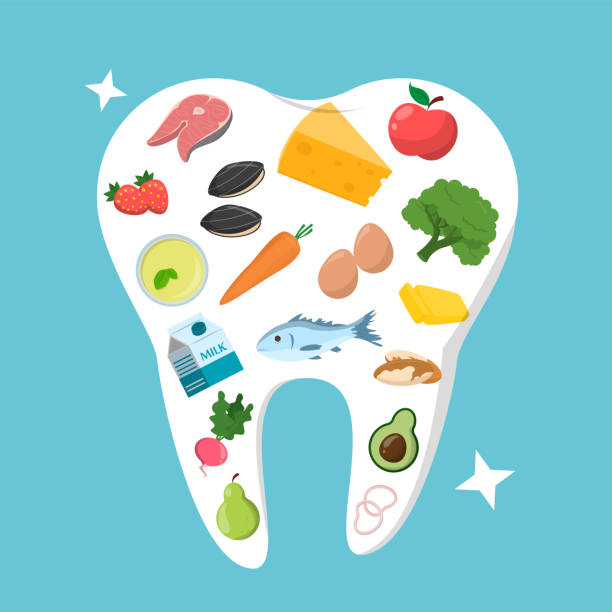Nutrition plays a significant role in oral health, influencing the development and maintenance of teeth and gums, as well as the prevention of oral diseases. Here’s how nutrition impacts oral health:
Calcium and Phosphorus: These minerals are essential for the development and maintenance of healthy teeth and bones. Adequate intake of calcium and phosphorus from sources like dairy products, leafy greens, nuts, and fish supports tooth mineralization and strength.
Vitamins: Certain vitamins, such as vitamin D, vitamin C, and the B vitamins, are important for oral health. Vitamin D helps in the absorption of calcium, vitamin C supports gum health and wound healing, and the B vitamins contribute to overall oral health and tissue integrity.
Fluoride: Fluoride is crucial for preventing tooth decay by strengthening tooth enamel and making it more resistant to acid attacks from bacteria. Fluoride is often found in drinking water, toothpaste, and certain foods, or it can be applied as a topical treatment by dental professionals.
Hydration: Drinking an adequate amount of water is essential for maintaining saliva production. Saliva helps to cleanse the mouth, neutralize acids, and remineralize tooth enamel, reducing the risk of cavities and other oral health issues.
Limiting Sugary and Acidic Foods: Consuming sugary and acidic foods and drinks can contribute to tooth decay and erosion. Bacteria in the mouth feed on sugars, producing acids that can weaken tooth enamel. Limiting the intake of sugary snacks, candies, sodas, and acidic fruits or beverages helps protect teeth from damage.
Fiber-Rich Foods: High-fiber foods like fruits, vegetables, and whole grains require more chewing, which stimulates saliva flow and helps to clean the teeth. Additionally, fiber-rich foods may help scrub away food particles and plaque from the teeth and gums.
Antioxidants: Antioxidants found in fruits, vegetables, and teas may help protect gum tissues and reduce inflammation, supporting gum health and reducing the risk of periodontal disease.
Balanced Diet: Eating a balanced diet that includes a variety of nutrient-rich foods supports overall health, which in turn contributes to oral health. Poor nutrition can weaken the immune system, making the mouth more susceptible to infections and gum disease.
Eating Patterns: Frequent snacking or grazing throughout the day exposes teeth to acids produced by bacteria more frequently, increasing the risk of tooth decay. It’s beneficial to maintain regular meal times and limit between-meal snacks, opting for healthier choices when snacking is necessary.
By adopting a nutritious diet and maintaining good eating habits, individuals can promote optimal oral health and reduce the risk of developing dental problems. Additionally, practicing good oral hygiene, including regular brushing, flossing, and dental check-ups, complements a healthy diet for overall oral well-being.

